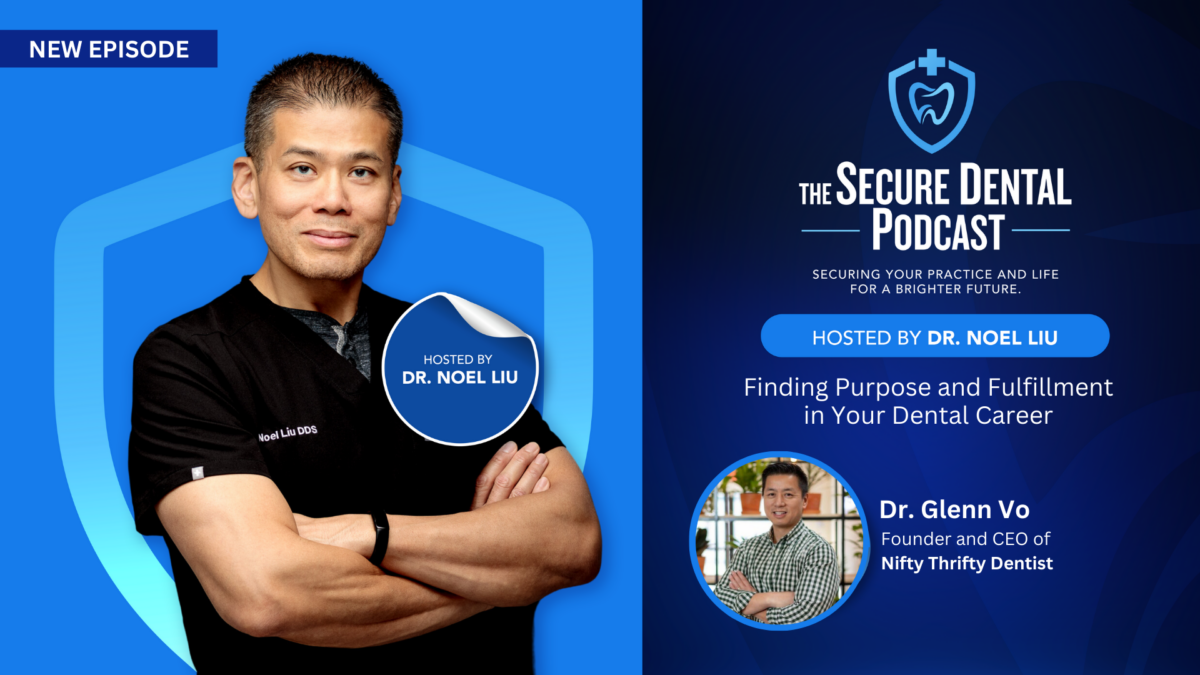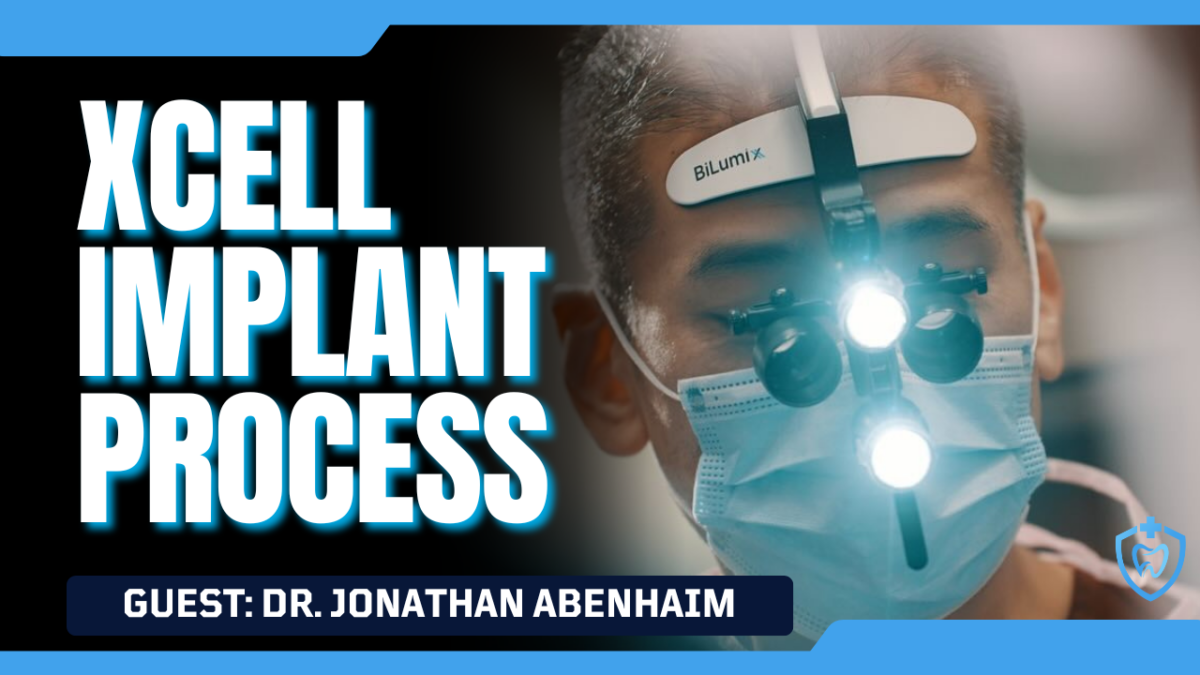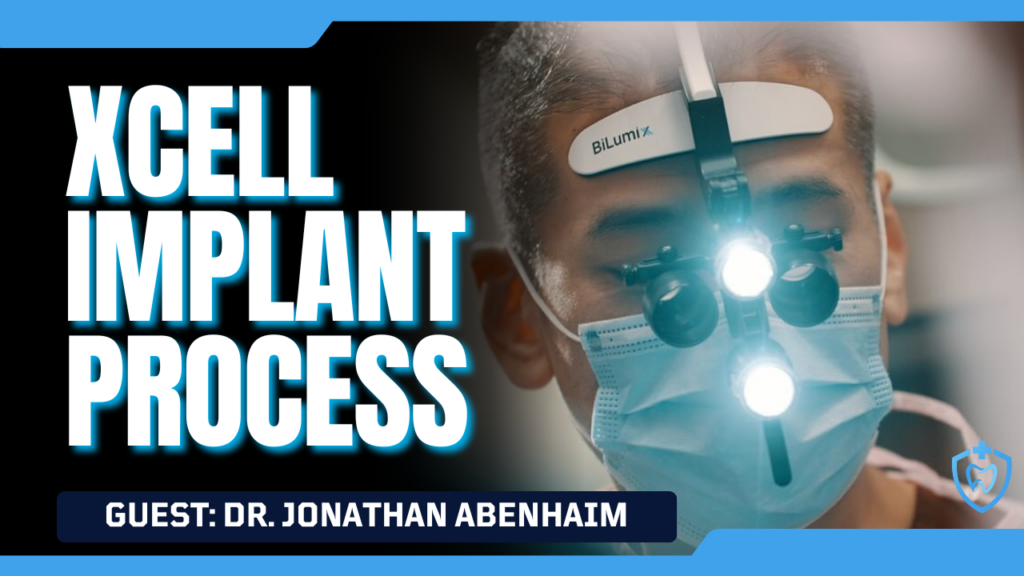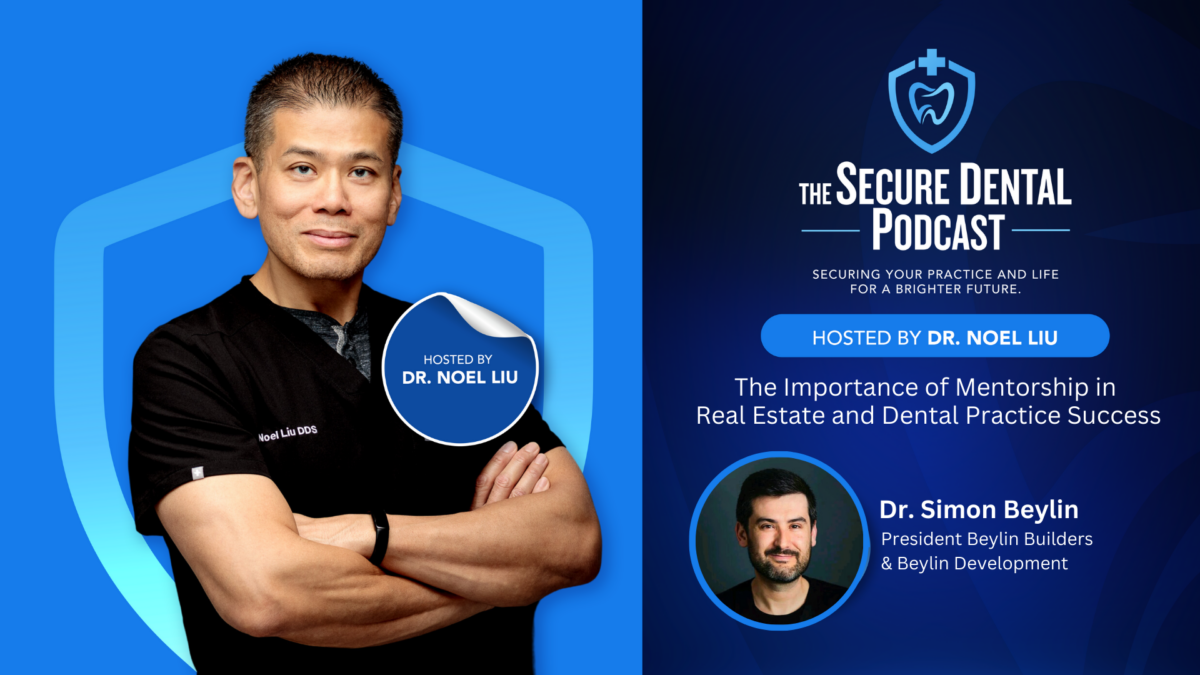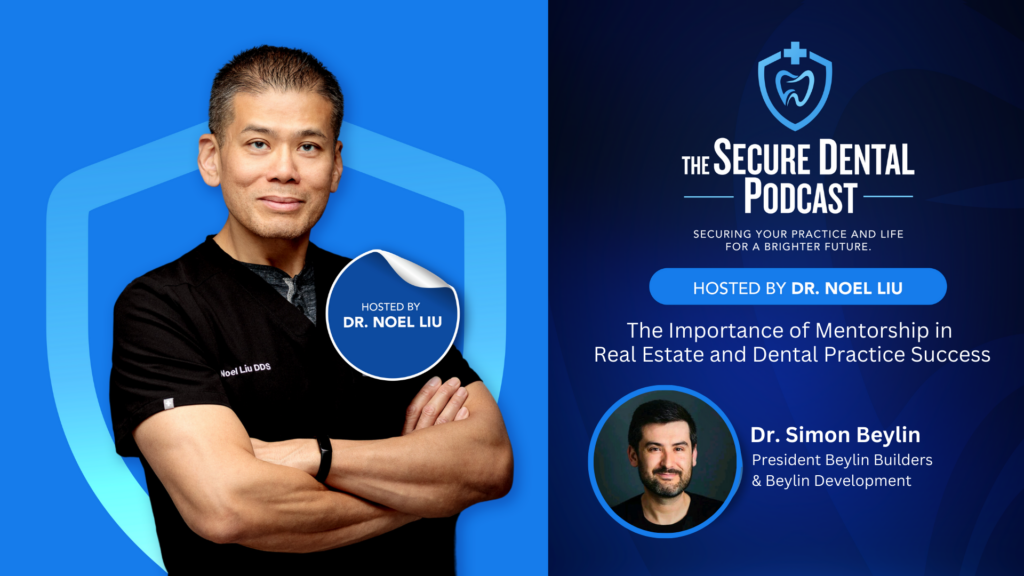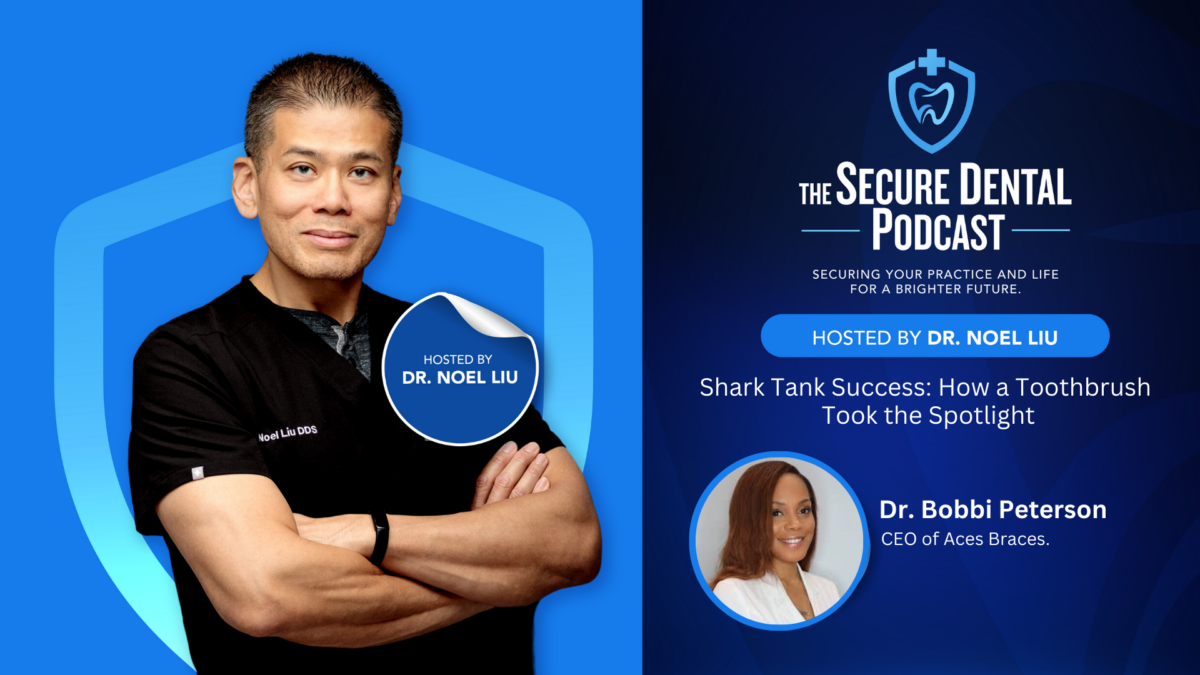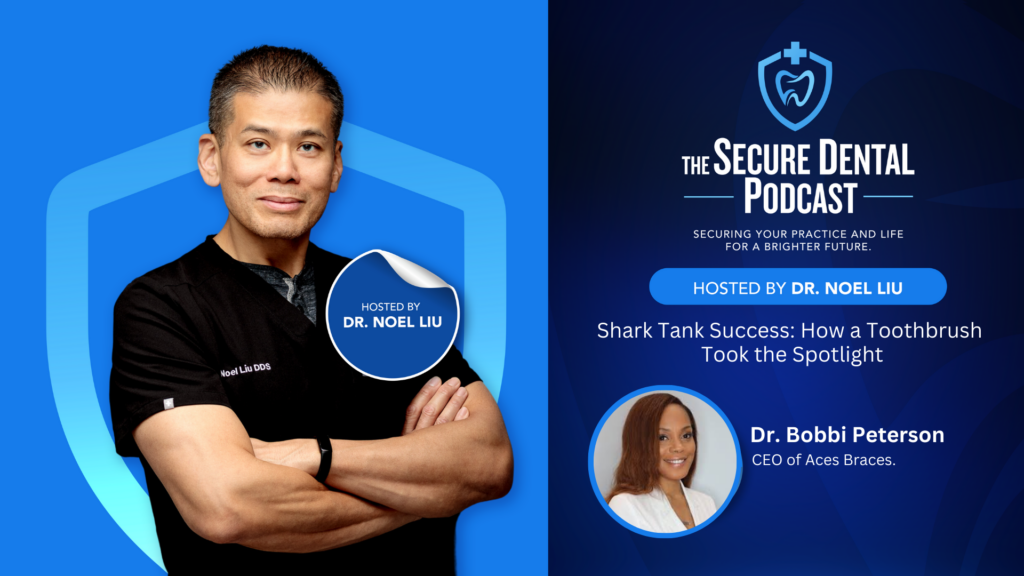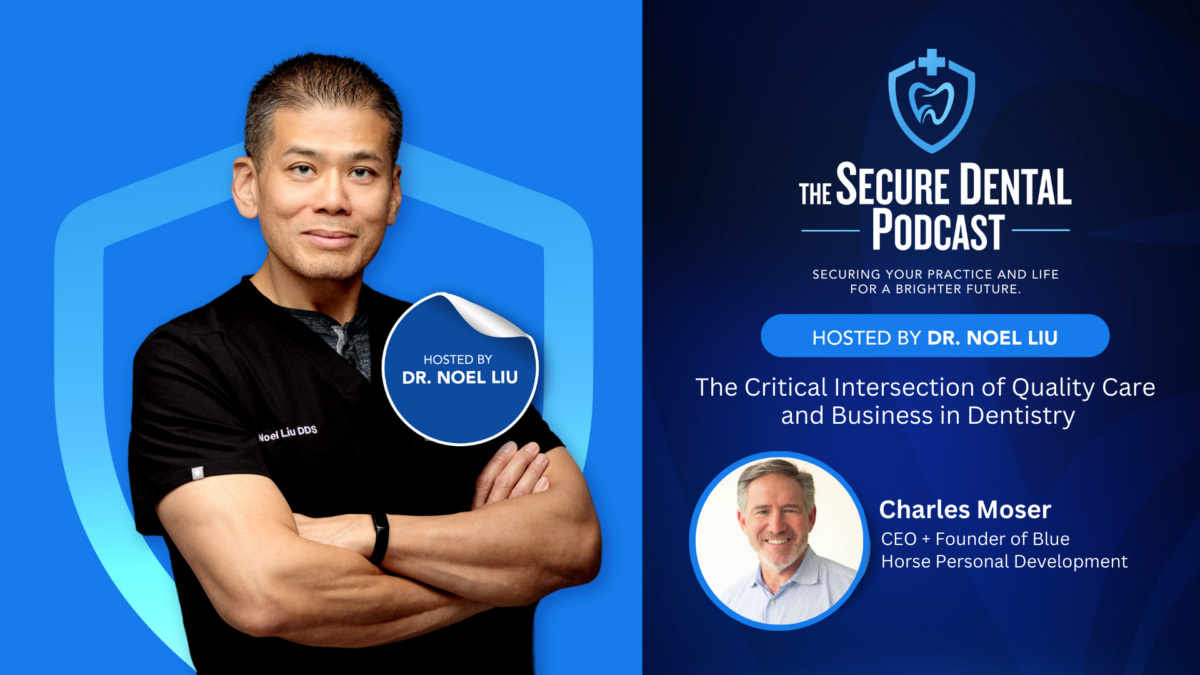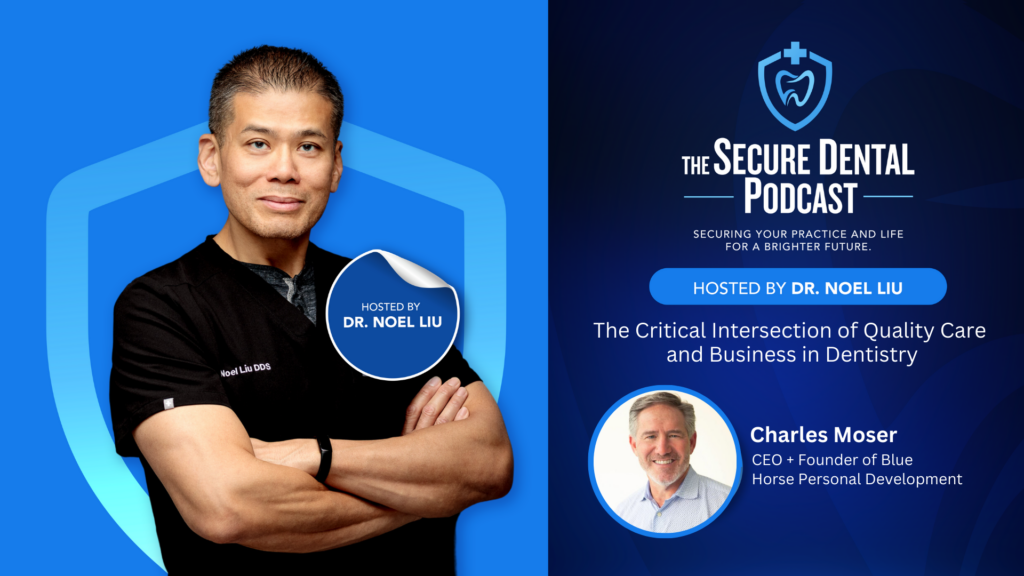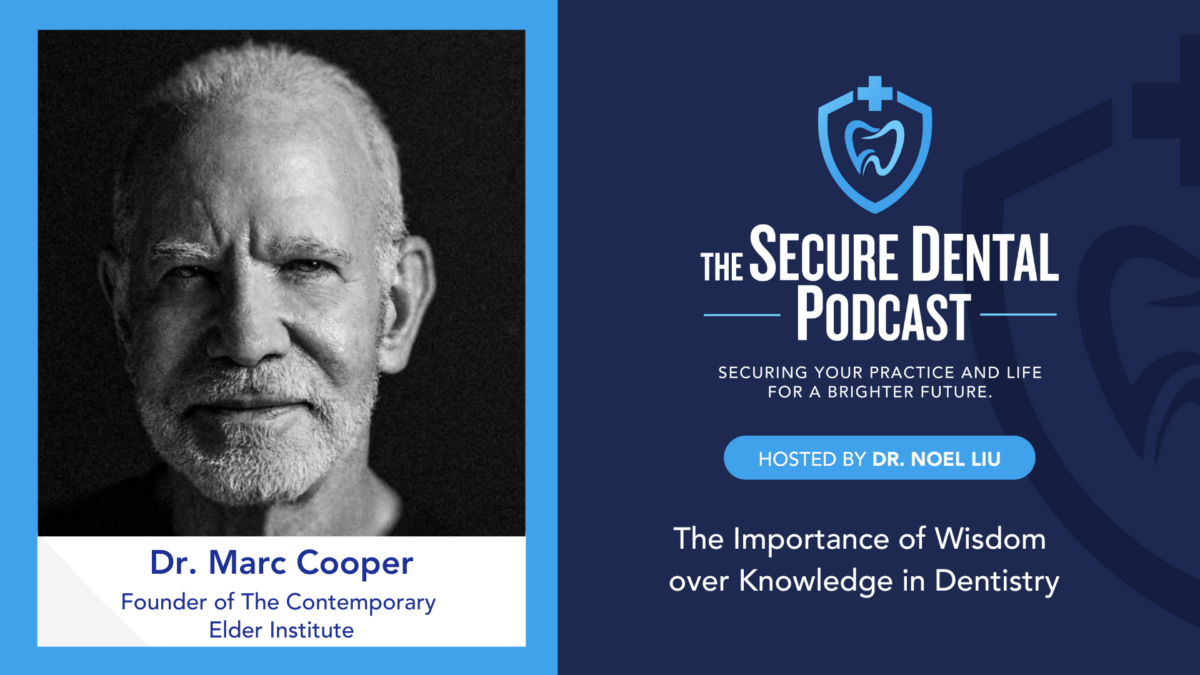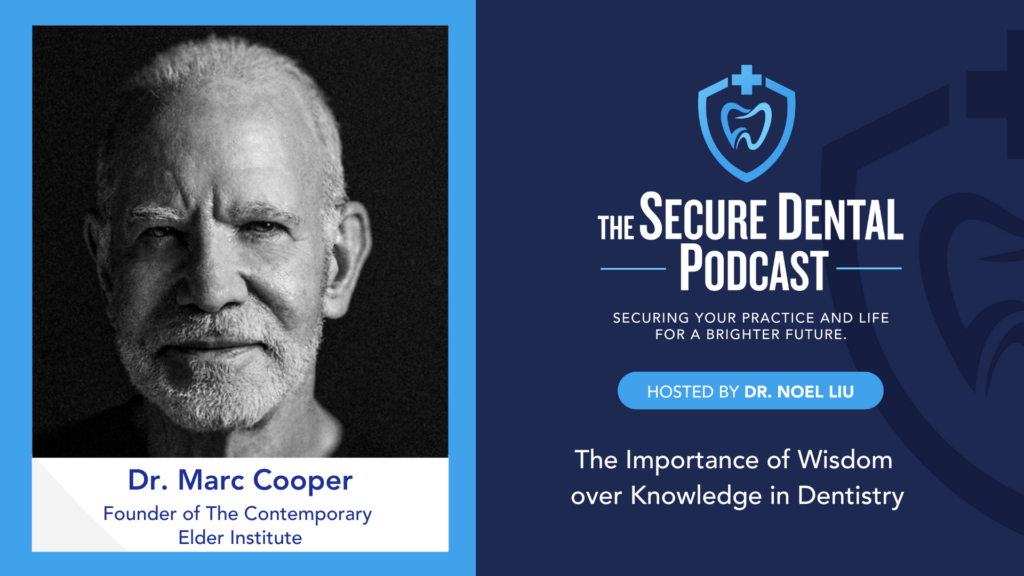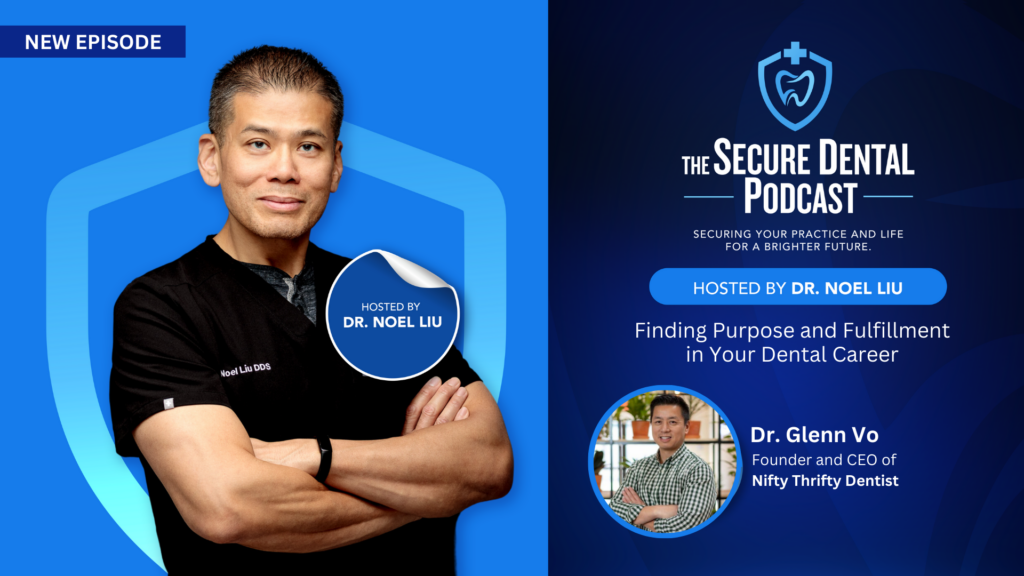
Summary:
Networking and building relationships are essential for success in the dental field.
In this episode, Dr. Glenn Vo, founder and CEO of Nifty Thrifty Dentists, discusses his journey in dentistry, the importance of honesty and helping others, and the value of work-life balance. Dr. Vo shares his transition from psychology to dentistry, influenced by his sister and his own realization of his potential. He highlights the significance of laying a strong career foundation, fostering a supportive environment, and not comparing oneself to others. Glenn stresses the challenges and sacrifices of starting a dental practice, underscoring hard work, determination, and the need for networking. He also touches on being resourceful, finding purpose, and the importance of giving back to one’s community. Finally, Dr. Vo emphasizes collaboration over competition and the need to adapt to different life seasons for work-life balance, and explains his unique definition of success every listener can benefit from.
Tune in and learn from Dr. Vo’s remarkable journey about achieving success, building strong relationships, and finding purpose in your career and life!
Secure Dental_Dr Glenn Vo.mp3: Audio automatically transcribed by Sonix
Secure Dental_Dr Glenn Vo.mp3: this mp3 audio file was automatically transcribed by Sonix with the best speech-to-text algorithms. This transcript may contain errors.
Dr. Noel Liu:
Welcome to the Secure Dental Podcast. Through conversations with the brightest minds in the dental and business communities, we'll share practical tips you can use to scale your practice and create financial freedom for yourself and your family. My name is Dr. Noel Liu, CEO and Dentist at Secure Dental, and also co-founder of DentVia. I'm your host for the Secure Dental Podcast, and I'm so glad you're joining in.
Dr. Noel Liu:
Hey. Hey everyone, welcome to another episode of our Live here. So this is Dr. Glenn Vo. So we are doing another episode of our Secure Dental podcast. This guy is such a treat. So before we get started, I just want to give a shout out to my sponsor: DentVia. DentVia is a virtual dental administration company, basically assisting our front desk in our dental offices to do all the back-end office tasks such as calls, eligibility, all the back, like lead generation calls and follow up. So definitely check them out. www.DentVia.com. That's DentVia.com. Now, without further ado, this gentleman needs no introduction. Glenn Vo, it's such an honor to have you here, man. He runs Nifty Thrifty. If most of you guys are not aware of Nifty Thrifty, I don't know where you've been living, but let's get down to it. I'll let you do the intro and let's dive right in.
Dr. Glenn Vo:
First of all, thank you so much. I've been a big fan of this podcast, a big fan of you. You're just not only just an amazing entrepreneur, but also what separates entrepreneurs is their generosity. And of course, I don't have to talk about what you've done recently in the dental community. Just so generous, willing to give back, but also not only give back from a monetary standpoint, but giving back with your knowledge and also uplifting other people and being an inspiration. So again, just want to let you know, especially as an Asian, just I always follow other Asian entrepreneurs and I'm like so amazing of what you've done. So thank you so much for having me on here. And I just want to let everyone know that essentially what I do is I'm just a connector of people, as at an early age, I've always been just like a resource, whether it's my friends, growing up, they're asking me like, Hey, what's a good place to buy these school supplies or something like that? And even in dental school, people ask me like, Hey, do you have a, hey, do you have some notes? Or you have some old test or something like that? I've always just been a resource. And literally that's just what I've done in Nifty Thrifty and speaking in podcasts. I just try to help others. I try to get as much knowledge as I can, make as many connections as I can, so I can be a resource to others. Now, how does that translate to the business world, right? If you are a dependable person, you are someone with integrity, and if you are someone who genuinely wants to help others, then people will come to you. I wish I could just share like some kind of, people always think, Do you have this secret like way to talk to people? Is there a negotiation, way to negotiate things? And I tell I don't. I truly I've read all those books. I followed the Grant Cardone's of the world, the Gary Vee's. Look, I've learned from all those guys. And all I can tell you is there's some good stuff there. But if you simply just are a good person, you're honest, and you genuinely want to help people, I promise you the opportunities will come. I wish I could give you something more complicated than that, but if you just do those three things, opportunities will come.
Dr. Noel Liu:
You said such a good point because that is exactly all these big boys have in common, right? You said Gary Vee's, the Grand Cardone's of the world. If you look at all the personal development space, there are all these guys, they all have one thing in common is to genuinely help somebody. The minute you do that, success follows, money follows, fame follows, everything follows. And you're like a proven legend right here, my man. You've taken your Nifty Thrifty such a long way. Let's get started from dental school. What, how did you get into dentistry, man? I would like to hear about that.
Dr. Glenn Vo:
So I want to share something that I think you will appreciate. There's something about growing up in an Asian household. When it comes to your siblings and sometimes your parents, they are very blunt and straight to the point and sometimes like it hurts your feelings. And I remember when I was in college, I just went through the whole college experience. My older sister was just like, she was a child prodigy. She got into dental school when she was like 20 years old. She became a dentist at 24. She didn't have any debt because she had the foresight to have the military pay for it. And so she was like the prodigy. I'm like the middle child. And they just say, just do it. Just try not to bring shame to the family. That's pretty much like my parents there. Yeah. Just don't bring shame to the family. Right? So what happened was, is that I was doing a master's program in health administration. I thought, Hey, that sounds like a good degree. Just slide by and whatnot. And I remember my sister reaching out to me. She said, Hey, come down and why don't you, my assistant is out sick. Can you come and just work for a week? I'll pay you really good. Can you assist me for a week? Little did I know that my parents and her, they had an ulterior motive. Wow. Because they were like, This guy has more potential. He's a smart guy. So I was there, and I remember assisting my sister. This was like near the end of the week. And she stopped.
Dr. Noel Liu:
How old were you?
Dr. Glenn Vo:
This was, I was, I want to say I was like early 20s. I already graduated with undergrad. I had a degree in psychology. I didn't even know what I wanted to do.
Dr. Noel Liu:
Kind of lost at that time.
Dr. Glenn Vo:
Yeah, it was a little lost. And I was doing this master's program because I thought you could probably make six figure income. That's all I cared about. So I was assisting my sister and I remember this like yesterday. I was suctioning. She was doing like, some composites. And she stopped what she was doing. And she looked at me. And she says, Glenn, do you want to be a loser the rest of your life? I was like, What? I was like offended. But only a sister can say that to her younger brother. She said that, she was like, Do you want to be a loser for the rest of your life? What's funny is that the patient that I was working on, she actually looked at me too. They all looked at me. The patient looked at me. My sister looked at me. And I was like shocked. And I said, No, I don't want to be a loser. On the spot. Even the patient looked at me because she wanted to know, do I still want to be a loser for the rest of my life? She looked at me too. And so my sister's, The reason why I brought you down here is because I wanted to see if this is something that you could do, because I feel like you have more potential than just getting some master's degree. And no offense to people who have a master's in health administration. No offense to them. But my sister saw that I had a little bit more in me, maybe the ability to be a doctor. And after that I was like, You know what? No, I don't want to be a loser. And so I actually went back to school, did a post-bacc program at UT, and started going to dental school. Now most people that get into dentistry because maybe they like to eat, maybe they like the science aspect. I actually joined and the reason why my sister brought me there is I watched her how she, I liked the business aspect and the relationship aspect. I liked the fact that as a dentist, you are a mentor not only to your team, but to your patients. You're educating them. And for me, I always had that in my heart. And so that's the reason why I wanted to become a dentist, because I wanted to be a professional that people went to for advice to learn from. And I liked the fact that you can mentor and you can uplift the team. So that's actually how I got into dentistry. Is my sister literally semi-insulting me and saying, You don't want to be a loser, but to this day I still tell her it wasn't for her, I wouldn't have been a Dentist. And honestly, that's what a good sibling is. They watch out for you. Especially the oldest sibling. You're, and I tell this to my daughter all the time. It's your job to lay the foundation, but you have the honor of being the oldest. God gifted you with that honor, so you have to live up to that honor. So that's how I got to industry.
Dr. Noel Liu:
I'm going to steal that from my daughter.
Dr. Glenn Vo:
I tell that all the time. Because like her younger brother, he's a true, my son's, I have a 14-year-old daughter, a 11-year-old son. And so my 14-year-old daughter, she's a competitive swimmer. Obviously, she's really into school as well. My son's a competitive wrestler. And so she, I tell her, You got to lay the foundation, like you going to practice two times a day. She had practice this morning. She had practice in the afternoon. Somewhere in between, she's doing some schoolwork too, and also relaxing because it is summer. And I told her I was like, You can't slack off because this guy is actually watching you. You have a. So anyways, you should put a little pressure on your daughter too.
Dr. Noel Liu:
So you play the psychological game. I love it.
Dr. Glenn Vo:
You got to ... And our parents did that too. Probably in a, maybe not in a, in their own way, but they played these things. But that's what good parents do.
Dr. Noel Liu:
Did your parents ever compare you to other people, like other, like your cousins or your? Man, I was sick and tired of that.
Dr. Glenn Vo:
To this day, I absolutely hate that. And actually, I refuse to do that with my own kids. But I have to say this though, and for those who are watching, who are dental professionals or health care professionals, I want you guys to think about this. And I got this from one of my mentors who I actually, I'm at this gym and these guys, these three, the three richest guys in the, in my community, they work out here. And I'm so lucky that they consider me as a friend. They always pass the advice. But what they always say is that what made you successful: don't rob your kids of that. And I say, What do you mean by that? Glenn, did you have all these things that you have right now growing up? I was like, No, I had to work two jobs. Like sometimes I remember, like, sometimes I had to walk home from school. Sometimes my parents can pick me up; all these things. And they're like, And was that a big reason for your success? I was like, Yeah, because I had to grind and stuff like that. They said, Don't rob your kids of that. I always remembered that and now it's up to us. I can't put my kids in my same situation. That might be like borderline child abuse. Like I can't put them in that same situation, but you can put them in situations that force them to dig down deep and work hard and grit. And so for me, that is putting them in athletics and putting them in like hard courses, because that's going to force them to look within themselves. And that's my way. So again, I know I've steered off a little bit, but I just feel like we.
Dr. Noel Liu:
No, man, that's a great advice because we as dental professionals, if we had a hard life, we always want to give it back to the kids in such a way that, oh yeah, you know what? Just have it easy, because I had it hard. And you know what? You're going to get it easy. But no, you're going to, like you said, you are robbing them off. And the thing is, you are taking away the glory, the glory that you get once you make it; you're taking that away. And I completely 110%, my friend, I agree with you.
Dr. Glenn Vo:
Yeah. And although there's a certain things that my parents did that, I'll be honest, to this day is still bothers me. You can't. And my sister told me this. She says, Can you complain about the results? I was like, Okay, I can't really complain about it. I don't like the means, but you can't complain about the results. And so what we've done, and I truly feel this as, and everyone who has kids can relate to this is our job is to be better versions of our parents, right? Like I want my kids to be a better version of me. And part of that is not just financial and not just scholastic and academic achievements. It's also helping them become a better person. So for me, it's I'm learning the lessons that my parents put to me. I'm just packaging it in a different way, so to speak.
Dr. Noel Liu:
I love it. So, Glenn, tell me this here. You graduated from dental school. What was the first thing you did? Did you, like, open up your own practice? Did you work? How was that journey like for you?
Dr. Glenn Vo:
Yeah. So what I did, and everyone's situation is different. For me, I wanted to help my family out as much as possible. My parents worked really hard and they never asked for anything. So this was not their idea of, Hey, come get out and so that we can retire. No. I wanted to help out. And so for me, like I was focused on, I need to get a job that can make as much money as possible. Yes, could I be an associate at a private practice and learn things and take it easy? Yes, but I need to make money right away. And so I went into corporate dentistry because I wanted that. Number one also to make as much money as possible to help out my family, but also I want to get exposed to as much dentistry as possible. So this group and the founder of this corporate group, I'm friends, he is my mentor to this day. He actually, just to let you guys know, a good way to recruit like-minded people is you share your story and if they resonate with your story, then you know you got that same guy. So he actually came from the same background. His parents owned a fast food place. He was going there after. He told me stories of actually doing his homework and going there and flipping burgers and helping his family, and he built this from the ground up. And so I resonated with that story. So I was like, I'm going to work for this guy. This guy has the same thing. And so I worked for a couple of years, and then my wife and I, we opened our practice. But something that I did, which a lot of times people, they think, Okay, they're going to quit their job and go to their office and start working. Look, guys, when you start your practice, you're not going to get your patient flow, cash flow right away.
Dr. Noel Liu:
Let's be real.
Dr. Glenn Vo:
You got to have your other job. That's what I did. And if my son was going to ask me how to do it, I would recommend this way for him. For some people might not work, but I literally was working six days a week, six days a week: three at my associate job, three at my practice. My wife, she worked a little bit more in the practice, but she was still working part time because we didn't want to take any money from the practice. We reinvested it into the practice, pay down the debt, expand, put money towards expansion. I didn't take any money while I had this other job. It wasn't until, it got to the point where he could support me, that's when I left. So that's what we did. It's I literally, when you talk about Nifty Thrifty is not a term I throw around. I lived it.
Dr. Noel Liu:
Because you lived it.
Dr. Glenn Vo:
I lived it.
Dr. Noel Liu:
Yeah. So when you were starting off, man. So I know what do you think about work? So for somebody starting off, you went through the grind. I went through the grind. Tell me, what does work life balance look like at that time?
Dr. Glenn Vo:
Yeah. So I'll tell you what, guys. I'm learning every day. And even back then I learned so much. But I truly feel that work-life balance is going to be different from everybody, again, for everybody. For me, I'm very involved with my kids. I'm very involved with my family at this season of my life. But I truly feel like work-life balance, you should look at it in the lens of seasons. Okay? Everyone has a different season in their life. In the beginning, if you don't have any kids and it's just you and your wife, or maybe you're not even married yet. You're in a certain season. If you're in a certain season where you don't have a lot of obligations to your family, then you shift your resources and your time maybe more to your business, right? If you're in a season where your kids are getting into the impressionable age, let's say their middle school, high school, you might want to shift things there because they really need you there. So when it comes to work-life balance, I tell people to look at the season you are in your life. So if you have the flexibility of you don't have kids yet and you have the ability to maybe be more, being able to plan it better, then maybe in a certain season you're like, Okay, hey, you tell your wife, Hey, you know what? Or tell your husband, Hey, let's just hold off on kids just for a little bit. Let's just get to this point and then let's get there. Now, of course, life happens. If you already have kids, then that's fine. Then you have to move things around. But work-life balance should be based on the seasons of your life. So look where you are, be, and if you're lucky enough, try to plan it so that when, because again, you can be a awesome father or mother if you're already past that grind of trying to build your practice. If your practice's a certain level, then you're going to be a better father. Now, can you juggle everything? Sure. Our parents did that, but I think we all can admit that you probably could have had your parents a little bit more in your life like they did. I know with my own family, as I've gotten older and I've become a father myself, like I'm a little bit more, have a little bit more empathy for my parents. I was like, Oh man, they did the best that they could. Maybe I complained. Can't pick me up? I gotta walk home? These guys are getting picked up or these parents are here. Maybe when I was younger I would complain. But as an adult now, I can see that. And so we understand. So just plan around the season. That's what I, that's my big advice for work-life balance.
Dr. Noel Liu:
Nice, nice, I completely agree. So when you got started, you opened up a practice. You got to settle. So how long did it take you? Because a lot of times people have this question that, Hey, if I open up my practice, what am I looking at? Two years, five years, one year? I know, again, everyone's different. But in your case, when you said to shift all the resources. And somebody goes, I opened up my practice, but I still want to play golf, I still want to enjoy life, and I'm single. And how long does it take to get that practice profitable.
Dr. Glenn Vo:
Man, so that question, it's going to be different for everyone. But I'm going to tell everybody this is that people who are successful like yourself, like other, these other amazing doctors out there, it wasn't an overnight thing. There's a lot of sacrifice involved. And when I'm talking about sacrifice, I'm not even talking about sacrificing, not buying that Benz or not buying that million dollar house. There's real sacrifices when it comes to also relationships, too. And I'm not even talking about relationships with your spouse. I'm not even talking about relationship with your family. There's relationships with your friends, right? Like you're going to have to go away for a little bit. Or maybe you realize that you only have so much time, so now you prioritize your actual relationship with some friends and whatnot. So for me, I knew that I didn't. I wanted to get rid of my debt as quickly as possible. Obviously, as I've matured now in my financial intelligence and whatnot, that's not necessarily a bad thing. But it took me a while to get that. But I came from the old school where you didn't want to owe anything. So for me, my practice was actually profitable, probably within six months. And then from there shortly thereafter, I wouldn't make sure that my wife. So my wife's a dentist as well. We met in dental school. But I wanted to make sure that she got out of that grind of corporate dentistry and into our practice. So she got into our practice full-time within that six months, and slowly I came over. But again, being Nifty Thrifty, meaning, Hey, I mean.
Dr. Noel Liu:
I save every penny.
Dr. Glenn Vo:
I want to have that nice car. Once you're a doctor, you should have this nice car. And I still drove my like, Honda, and my wife still drove her Toyota. That was working really good. We did buy a house in a few years later, you know, but we try to resist that because we wanted to build that foundation. We wanted to get build up like that nest egg so just in case we have some slow months and whatnot. And that's how we did it. And when I say Nifty Thrifty, I'm talking about if I had to go there and had to change out the filters and do the stuff, I'd do it myself. If I had to go out there, people always talk about marketing. Okay, I want to, let me put all this money in marketing. You know what my marketing was in the beginning? I literally went to every business and met them and shook their hand and offered them like a amazing deal. Like, I'm free exam and cleaning for you? And I'll give you like the discount plan for free for your team. I asked them, I was like, Do you have health insurance, dental insurance for your team? And other small businesses, they have the same problems. No, we don't do that. I was like, How about I help you out? How about I give you this discount for you and your team to come to my practice? That's literally how I got my first patient. And to this day, this guy who owns, like, the most popular burger place in the town that my practice is in; he's still a patient today. And guess what he does? When people talk about this, Go to my dentist; he's the best. Right? And again, think about it. What better way to get patients when other businesses say, Hey, my dentist is Dr. Vo. He's the best. You got to see him. Now, of course, as I'm not in the practice as much, people only want to see me. So they're like, Dr. Vo is only here for a couple of days. You can see his associate. And so that kind of can get troublesome. But again, that's how I built my practice the old-fashioned way.
Dr. Noel Liu:
That is such a great tool. Because here's the thing, man. If we are starting off our practice, we are broke. We got all the student loans, we got all this expenses, payroll, you name it. Right? Why would somebody have this arrogance and this feeling about, No, I'm a doctor; i'm not going to do that? I don't understand that. And like you, I did the same thing. I got thrown out of the parking lots. I was putting those flyers in my, on those parking lot cars. I got thrown out, security came in. Hey, you cannot do that. You got to leave right away. So I feel like, hey, listen, man, if you have to clean up your own crap on the floor, you have to do all this stuff yourself, there's no shame in it when you're starting off. And I think as a learning lesson from you, what you just said, you shared, it really resonates with me because we have to put our ego aside at that time and just go for it.
Dr. Glenn Vo:
Yeah. No, absolutely. Again, it's, I won't, I wouldn't change anything. Obviously, there's certain investments I wish I got in early, right? Like I'm sure all of us. But as far as.
Dr. Noel Liu:
It's never too late.
Dr. Glenn Vo:
Yeah, it's never too late. But as far as just working really hard in the corporate side and doing all that, I wouldn't change anything. No, it's not for everybody. But I had to go through that because then it gave me the kind of like conditioning. Like I went through that, I worked my butt off. I can do the same thing for my office and work my butt off as well. And so again, it's just like doctors, everyone wants to look for a shortcut. And there are shortcuts. There are shortcuts, but there is no shortcut to hard work. The faster you get that through your head, and this is anybody, if you're an associate right now and you feel like there's more, something more for you, you want to open your practice, there is something more. But don't trick yourself into thinking that when you open a practice, you're doing less work. You think like the owner. We're sitting here twiddling our thumbs. We paid our dues. That's the thing. We paid our dues and we took the risks. So I'm telling all these young doctors and even like associates that moved on from my practice, I say, I wish you the best of luck and I want you to do well. I want you to actually use the things that you learned here, because then I did my job. But make no mistake, you're going to work your butt off, and you are going to wonder if you made the right decision, because we all did at one point in time when we opened our practice.
Dr. Noel Liu:
I don't know about you, but I had always had a mind where I was like, Hey, do I want to quit? Always passes your mind. So let's dive into Nifty Thrifty. When did you get this launched and how was it? Like, how long ago? What is it? What is the scenes? You know, the whole thing behind.
Dr. Glenn Vo:
Yeah. Since 2017. And I'm going to share something that I know that you feel very passionate about. And that is: Sometimes you have to be in different rooms. You have to be around people who are doing more because they show you what's possible in your life. So sometimes you happen to be in that room. Sometimes you have to pay to be in that room. But again, like if you get in these different rooms, these mentors or these people around you, they will show you what is possible. And for me, I share a story of one of the coaches that I had. She was really instrumental in helping me change the culture of my practice, just teaching that part. Like I knew the dentistry, like I knew how to work hard. I wanted to learn more about the culture of practice so I can better motivate my team because everyone has a different, let's be honest, everyone has different motivations and different levels of ambition, and you have to be able to work with people who are at different levels, whether it's intelligence or motivation or work ethic. You have to work with all these different people. That's what make up your practice. And so she was a coach who helped me deal with that. And remember when we were done, she looked at me and she says, What's next? So what do you mean what's next? I'm going to grow my practice, get it to a certain level, and either sell it and retire and drink pina coladas on the beach. That was just like my goal, everyone's goal, right? Starting out. And she says, No, no, I see that you have more potential than just this. I feel like you have more potential to impact people beyond the four walls of your dental practice. And she planted the seed. And I started thinking. And I was like, maybe there is something to it. And from there, I've always been a person who was really resourceful. I had to be resourceful because that was my upbringing. When you don't have a lot, you have to figure out a way to get more, whether it's like working an extra job, maybe doing some side hustles, figuring out a way, I grew up with four other siblings, being able, getting some attention for your parents, try to. You have to be resourceful. So I've always been a resourceful person and that's how I grew my practice. Right? I've used dental equipment, bartering with other businesses to help me, bartering with the contractor so he can help build out some extra ops for me for dental work, bartering with the local Maelor place so that, doing dental work for her kids so I can get an ad in the local mailer. Like I was always very resourceful and so I was always giving advice to other dentists about sourcing different money and stuff. And so that's literally how Nifty Thrifty got started. People were asking me questions. They were asking me questions. Another Facebook group I had, which is called Dental Garage Sale, they were asking me questions about saving money, and I was like, Let me start this other group. And slowly what happening was vendors started coming to me. They're like, Hey, how do we get some exposure? I was like, maybe we can work out a deal where you win, I win, and the group wins. And literally, I was just doing something. People were like, they get blown away about what I did in the group. But I will tell you guys very simply. Everything that anyone does in business is pretty much a time-tested technique, right? Marketing in the Facebook group is the same if you were joining a Rotary Club and you were networking. It's basically networking. So what I want people to know is that the answers to growing your business has already been established. Someone who wrote a book, Think and Grow Rich, long time ago, okay, long time ago, it still applies. What you have to understand is that you just have to change the environment. The concepts are the same, the environments are different, right? The environments that you do, being just smart in real estate, you also can bring it into cryptocurrency, right? Like the concepts are still there. And if you break the rules, doc this, if you break the rules, that's what you get in trouble. You pay the price, okay? You pay the price for being arrogant, okay? You follow the rules of business, whatever it is, and you're okay. And so literally, that's how Nifty Thrifty. And so from there, I'm a big believer of not being complacent, doing deals and discounts. Okay. Then we move up to let's get some advice in there. Let's move on. I try to level up more. Okay, let me get the message outside of my group. Let's do podcasts. Right? Let's do events. Let's do speaking. And so that's how it happened. Again, like I, one of my books that I wrote, Industry Influencer, because so many people, they asked me like, how do you do what I do? I'm like, it all boils down to figuring out what your genius ability is. So a genius ability is basically a skill that you have that no one else has; other people might have it, but you're really good at; and you just got to figure out: Does your industry need it? Can you make, and you can make money off of it? And that's your genius.
Dr. Noel Liu:
And that's in your book, right?
Dr. Glenn Vo:
That's in my book. Yeah. So for me.
Dr. Noel Liu:
What's it called again?
Dr. Glenn Vo:
I don't have it right here. I actually have my other book, my Nifty Thrifty book right here. But again, like I tell people just I literally lay out the blueprint because everyone has like a special skill. Like, Doc, you have a special skill, you have this special skill, just knowing, just being really, you're very good at all the details and whatnot. You grew this group practice and you've done these investments because you can see that those things, you have this special ability. Everyone has a special. For me, it's being able to network. Right? That's my, I do that naturally. I don't even, and that's why if you figure out what your genius ability is and you figure out a way to build your business around it, you will never feel like you're working. Doc, I'll tell you right now, I probably work more now than I ever did chairside. But it doesn't feel like work to me. It's easy. Like I'll do this all day. I have to sometimes make sure I don't do this around my kids. Like, sometimes I'll get on a call and we'll work out some deal. And my kids are in the car and I'm like, Oh my gosh. And it's so funny because now my son, he now will say, Hey dad, dad was talking about just getting equity in something, like he's using those words because he hears me bring it up so much. I have to, I need to stop. I need to stop doing that. But if you figure out what your genius ability is, you will never feel like you're working. You will feel like you're just having fun. And I'm just blessed to be in that position.
Dr. Noel Liu:
No, that's great man. I think on that note, I think that's a good thing. I personally feel it's a good thing for our kids because now they know what daddy is doing, and I think that's going to give them a really good head start on what they need to do. I feel that's a good thing.
Dr. Glenn Vo:
Yeah, absolutely. Yeah, absolutely. I, my, it's funny as we go through different seasons of life and I don't want to share this with everyone because everyone's always looking for purpose. I think if you find purpose in your life, and not to go down a spiritual path or anything, I can relate this to anything, if you find purpose in your life, then you will always have somewhere to go. And I think like a lot of times when doctors, they get the practice, they're doing good and then they're like looking around, what else? Like, I can go vacation, I can retire, I could do that. But if you have purpose in your life, and for me, purpose has shifted from the what I want to who I want to serve, right? And at the most basic way of putting this. For me, it's I want to keep pushing because I see my kids are watching. And I want them, I want to show them what's possible because I feel like they can do so much more. And so a lot of times when people are searching for purpose, maybe you should shift it from the I want to attain this, I want to achieve this, to the who, which is maybe it's your, maybe it's your kids, maybe it's your wife, maybe it's your community. If you shift it to the who, how are you going to serve these other people, you're always going to have purpose. So anyways, that's something that I'm always.
Dr. Noel Liu:
That's a great point to drive home, by the way. It's all about the why and the purpose. And here's my thing on the take on the same note. I always believe that no one is better than anyone, right? We all have different powers. We all have different skill set. And at the end of the day, man, all we got to understand is we are human social creatures. We need to collaborate. Once we collaborate with network, we can tap into the mastermind and create our own mastermind. And that's how I feel we should be going in dentistry rather than competing and beating each other up. You know how it is, right? But collaboration is the key. And that's the new net worth, in my opinion.
Dr. Glenn Vo:
Yeah. No, I 100% agree there. I feel like if you have a scarcity mindset, you are missing out so much. You are missing out so much because there's going to be someone, even if they're in the same space, even if they have a practice in their same area. Right? Maybe they're doing the exact same thing. There is so much opportunity out there. There are so many people that need help. And if you just cut yourself off from that relationship, maybe that relationship, and I'll tell you, doc, a lot of times the things that I've gotten fortune that have been really successful for me is just because I just happen to be introduced to somebody. I just happened to meet someone. Someone met again, like a really big, I was a part owner in a dental lab that we just exited, and I happened to make that, I got that introduction through a friend who, he made the introduction and he couldn't do business with this person. But I got introduced to this person. And lo and behold, we got into this business venture. Right? So again, you never know who you're going to meet. You never know. The guy that's picking you up, the Uber guy could just mention something and give you an idea. Like everyone, and that's why I believe what you just said there that everyone has, if you go through life realizing that everyone has a purpose and a value, you're going to get so much opportunity. The second that you feel like, just like what you said earlier, the second you feel like you're better than people, that's where the opportunities dry up. That's where the learning stops. Anybody, any from the guy that is bringing you your food, the person who's checking out, everyone, you can learn something from everyone. I truly believe that. In fact, I learn all the time from people; listening to them, interacting with them. You have that mindset, you're going to get so much info.
Dr. Noel Liu:
And that's what it is, because you are so aware of the opportunities, because you're aware of it. A lot of people say you got to be at the right place at the right time, but I believe that you got to be at the right place at the right time and also be aware. Because if you're not aware, you could be at the right place at the right time all day long. But you're never going to take action.
Dr. Glenn Vo:
Oh, yeah. No, I mean absolutely. Absolutely. Again like you can find lessons in everything. I'm a big sports person. So I always look at lessons when it comes to sports and how things happen. And again, yeah, being at the right place at the right time. But also sometimes you're not at the right place unless you're working hard.
Dr. Noel Liu:
Exactly.
Dr. Glenn Vo:
And sometimes people don't want to, I wouldn't say not talk to you because I think for the longest time I was I grew up with very little. So I always had a chip on my shoulder. I was like, I always had to prove things. But I think what I changed my mindset is, no, it's not because people don't see your worth, right? They just don't notice you yet. And it's up to you to try to get to another level for them to say, Oh my gosh. And so for me, for the longest time, Oh, this guy blew me off or whatever. And it's not that. They're so busy. They're so busy. There's so many things going their way. But if you're working really hard and you build something, then all of a sudden people will notice you, right? So it goes back to all those things come into play. But there's no shortcuts. Tom Brady just actually just had his retirement ceremony. And his, one thing that he kept on, that he got his jersey retired by the Patriots. And in his speech he says: No shortcuts. He kept on saying that: No shortcuts. And you got to put hard work in there. And yes, there is some shortcuts, but there's no shortcut to hard work, no matter what.
Dr. Noel Liu:
Don't you agree with all the sport greats and all like guys like Kobe, Jordan, Brady? Everybody has the same work ethic. You got to put in the reps, you got to put in the reps.
Dr. Glenn Vo:
Again, those guys are like all-time greats and amazing people. And even when they say that, right, these guys are just God-gifted. They have everything. You probably thinking like, Oh, Brady's, he's a tall guy and he has a good arm and everything, but I like using him and Kobe. In fact, I actually have, they're like, in my office here, I actually have a painting, a picture of Kobe, of Brady, and Jordan up there as well with some sayings, because yes, they're amazing people, but they had to work so hard. If you guys, again, like I already mentioned, if you're like a good person, you have an abundance mindset, you're willing to help people, you're willing to work hard, you do those three things, you do those four things, success is going to come. You don't have to, of course, it's helpful if you get more knowledge, read more books, but if you just do that, success will come.
Dr. Noel Liu:
I love it. So what's next step for you?
Dr. Glenn Vo:
Next step is something exciting about is again, I'm trying to surround myself by people who, you know, such as yourself, such as Dr. Gianni Montanucci, all these different people who are just amazing investors, who are just, who surround themselves with a great network. So for me, honestly, what started, I'm actually co-hosting a conference that actually you're going to be at, that you're going to be at; that passive investing for dentist conference. And actually, what happened, i'll tell you the story behind that. The story behind that was I reached out to Dr. Gianni. I was like, Hey, I just, can you like give me some resources? I just want to learn more. I just want to learn more. I don't want to become like a real estate professional. Like I don't have time for it right now. I just want to learn more. Can you just connect me? And he mentioned you and a few other Facebook groups, and I was like, I just want to be around good people who are like, they just want to share and they want to share in like the deals that they're doing. Like, I'm not looking for someone who just wants to sign me up for their mastermind or whatnot. I want to see if they want to share that. So he was like, Let's do a meetup. Let's get like ten people. I'll bring some people in my network and you bring some dentists, and let's just have them meet up in Dallas. That's what it started off with. Then what happened was people are like, Can I come to this meetup? Can I come? And we're like, Okay, fine, we're gonna have to do like a little event. 50 people. So then more people start to get invited. And now he was, Gianni was like, Glenn, more people want to show up.
Dr. Noel Liu:
You guys are sold out.
Dr. Glenn Vo:
Yeah, so we sold out. So then basically what we did was we, I had to scramble around, find another venue last minute.
Dr. Noel Liu:
No way. You guys are actually finding another venue, like a bigger size?
Dr. Glenn Vo:
And so now, so now we're going to do 100. And I told Gianni I was like, There's no way I'm going to get anything bigger than this. So right now we have 30 seats available and that's it. Like I can't do anything about it. But what started was we were just going to meet up and I just want to learn more. And now a bunch of people want to come together and learn more, and I'm excited. You're going to be there with a panel with a few other amazing.
Dr. Noel Liu:
I'm excited, I'm excited. When is this? August 16th, right?
Dr. Glenn Vo:
August 16th. It's in Dallas. It's in the town outside of Dallas called The Colony, which is an amazing area. And again, like we literally, we had to find another venue, we found it here, to get more people. But for me, it's all about just learning more and leveling up and just getting surrounded by other people like yourself who have an abundance mindset. Because I just want to get better. I just want to learn more. And what I'm hoping is.
Dr. Noel Liu:
There's very few of us out there. I'm not joking. You know how it is. When you look around. It's hard to find like-minded people.
Dr. Glenn Vo:
And that's the thing, and that's the thing. And we're so excited about this because I want to learn more when it comes to this. Because if you look at, I'll be honest with you guys, if you look at the amazing entrepreneurs out there, even some of the athletes I just brought up. Learning never stopped for them. They were good at making money in a certain way, but they wouldn't have learned other things. And that's really the, I'm not saying that I'm going to become a real estate professional, but I do want to know what's out there because I see all these other high-level people benefiting from these things. And again, you have to work with the people that have been there, like yourself and Dr. ... and all these other guys who are willing to share that knowledge. Because look, at the end of the day, you start as a dental professional too. You are giving back to your alma mater and helping all these people out. Again, guys, for me, I'm looking at you. And I'm like, I want to get, how did he do that? But at some point, you started where I was and that's what it's all about, right?
Dr. Noel Liu:
I learned this from Tony Robbins. The secret in living is giving. And that's one thing I've noticed. Like, ever since we pledged that amount and ever since we did a lot of the other stuff that we do on the side, the business automatically just gets better. It's crazy karma. Like people just say, Hey, how are you doing it? You don't have to do it. It's just, it just happens without getting too spiritual, right?
Dr. Glenn Vo:
No, I love it. It's just. And I will tell you, as someone who has saw what you did, it's inspiring to me. It's inspiring to me because it's when you give like that and when you're willing to help others, you don't know who it touches. And for me, I was like, Wow, that's amazing. Like I, and when you give like that, it ends up helping more people.
Dr. Noel Liu:
More impact, more people. And I wish everybody did at a grassroot level. And this way then, you know what the school doesn't need to borrow money from Delta Dental.
Dr. Glenn Vo:
Yeah. Yeah. Exactly, exactly.
Dr. Noel Liu:
So yeah. Glenn, hey, it was amazing conversation. So two things here. I just want to ask you, what does success mean to you and how would you define family?
Dr. Glenn Vo:
What's funny is that defining success, I want to say, the majority of my adult life I've tried to search for that definition, right? And early in my career, I thought it was a dollar amount. I thought it was a maybe amount of material things. Maybe I thought it was also the ability to do stuff for other people in my family, what I could give them. But what I realized as I've gotten older and gotten mature and lived life a little bit more is success to me, is the ability to spend time with the people I love without restriction. And what I mean by that is that's my family, the people that I love working with, without restriction. And literally that goes to freedom. That goes to freedom. I think at the end of the day, when people are searching for the things that they think they want, like I want X amount in my bank account, I want this, I want that, what they're really asking for is the freedom of it. And so for me, it's the, but not just, freedom for me is the ability to spend time with the people I love. I've gotten there. I'm looking for deeper levels of that. I'm lucky enough to be able to pick up my kids every day from school, take them to their activities, have a schedule that's flexible enough for that, and also do good and fulfill myself as well. Spending time with the people I love without restriction. And there's different levels of that. I'm just trying to get to the deeper, that's like the Zen state to get to the deepest level of that. Again, people I love is is not just my family, but people that I like to work with, I like to mentor, that are like family to me. That's what success. And of course, family is something that's more, that's goes beyond just your blood family. I think we all can agree that sometimes our blood family probably doesn't treat us the best sometimes. So family for me is the people that touch you on a deeper emotional and spiritual level. I have people who are not my blood family, but I consider family members, mentors who I feel like consider they're my, big brothers, big sisters. And so that's what it is. So again, like family is not limited to just blood, but it is the people who affect you on a positive way, spiritually.
Dr. Noel Liu:
I love it. Great. All right, my man. I appreciate your time. Thanks for joining us here. It was great insight.
Dr. Glenn Vo:
Thank you so much for having me on. And for those who reach out to me anytime, I'm easy to find on social media, LinkedIn, Facebook's best way. Happy to talk to everyone. Again, that's how I run my business, run my life by connecting with more people. So if you have any questions or anything, let me be of service to you. Reach out to me.
Dr. Noel Liu:
I love it. This is Dr. Glenn Vo. Ladies and gentlemen, we're going to land a plane. And if you guys have any questions, we're going to put a link below. He is not hard to find. He is everywhere and definitely Nifty Thrifty. If you guys have not heard of it, I don't know where you've been living, but definitely look it up and be a member. Join. He is a great resource. So with that being said, make sure to like and subscribe. We'll see you guys on the other episode, and for now, have a good one.
Dr. Noel Liu:
Thanks for tuning in to the Secure Dental Podcast. We hope you found today's podcast inspiring and useful to your practice and financial growth. For show notes, resources, and ways to stay engaged with us, visit us at NoelLiuDDs.com. That's N O E L L I U D D S.com.
Sonix is the world’s most advanced automated transcription, translation, and subtitling platform. Fast, accurate, and affordable.
Automatically convert your mp3 files to text (txt file), Microsoft Word (docx file), and SubRip Subtitle (srt file) in minutes.
Sonix has many features that you'd love including automated translation, collaboration tools, automatic transcription software, generate automated summaries powered by AI, and easily transcribe your Zoom meetings. Try Sonix for free today.
About Dr. Glenn Vo:
Dr. Glenn Vo is a practicing dentist, best-selling author, dental entrepreneur, and karaoke enthusiast. He is the creator of Nifty Thrifty Dentists, a social media platform that reaches over 54k dental professionals on Facebook and 23k subscribers on YouTube. Additionally, he founded Dental Lifestyles Magazine, a quarterly publication for dental professionals across the US. Dr. Vo is a USA Today Best Selling Author with his debut novel “2612 Cherryhill Lane” and a Wall Street Journal Best Selling Author with his business book “Industry Influencer.”
Dr. Vo coaches professionals nationwide, helping them become thought leaders in their industry. He is also the owner of Denton Smiles Dentistry, a large group practice serving the Greater Denton Area since 2009. Through Nifty Thrifty Dentists and Dental Lifestyles Magazine, he supports dental professionals in advancing their careers and helps dental companies grow by increasing brand awareness within their networks.
Dr. Glenn Vo lectures across the country on dental overhead management and social media strategies for dental corporations. In his personal life, he continues to combat tooth decay and gingivitis in his practice while serving as an Uber driver for his kids and a trophy husband to his wife, Susan.
Things You’ll Learn:
- Resourcefulness can help grow a successful practice and achieve financial freedom.
- Finding purpose in life and career shifts focus from personal achievements to serving others.
- Collaboration and an abundance mindset open up more opportunities than competition.
- Challenging situations help develop skills and qualities necessary for professional success.
- Giving back to one’s community and alma mater fosters personal growth and success.
- Success goes beyond material possessions and includes spending time with loved ones and mentors.
Resources:
- Connect with and follow Dr. Glenn on LinkedIn, Instagram, and Facebook.
- Learn more about Nifty Thrifty on LinkedIn and their website.
- Discover more about Dr. Glenn Vo on his personal website.
- Buy the Nifty Thrifty Dentists book by Dr. Glenn Vo here.
- Get a copy of Industry Influencer by Dr. Glenn Vo here.
